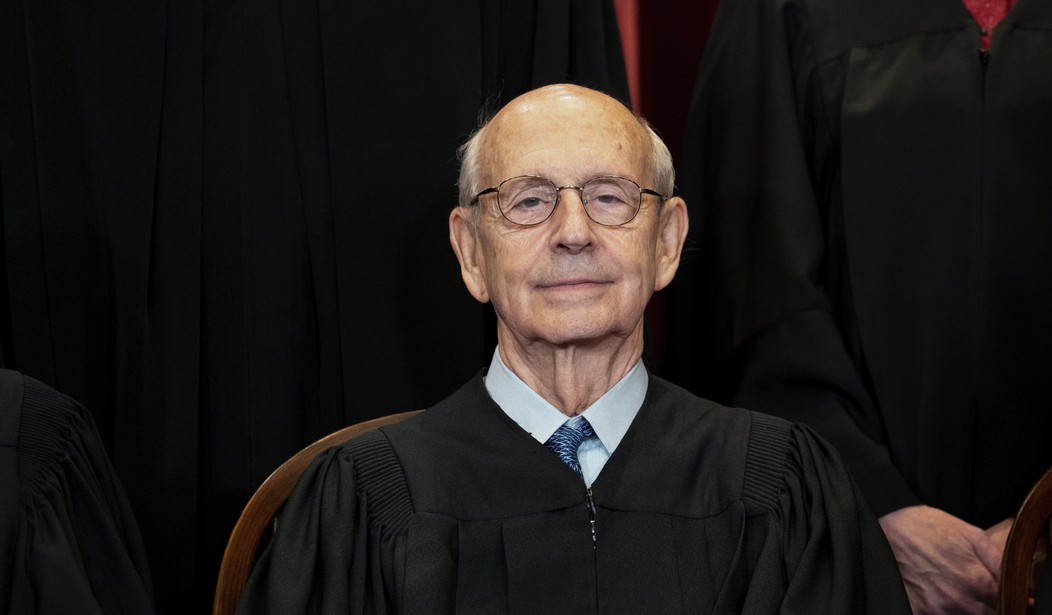Progressives really want Justice Breyer to retire but they are also a bit hesitant about appearing too eager. But the closer we get to June, the month when retirements are usually announced, the more articles about Breyer’s retirement keep popping up all over the media. Yesterday the NY Times published one saying that Breyer probably won’t retire because he’s determined not to let his own retirement be politicized.
My experience of more than 30 years as a judge has shown me that, once men and women take the judicial oath, they take the oath to heart,” he said last month in a lecture at Harvard Law School. “They are loyal to the rule of law, not to the political party that helped to secure their appointment.”…
“If the public sees judges as politicians in robes,” he said, “its confidence in the courts, and in the rule of law itself, can only diminish, diminishing the court’s power.”…
“Breyer is a justice who is with the chief justice in trying to protect the institution,” said Professor Ward, a political scientist at Northern Illinois University. “Justices care about the court, and the court is arguably very vulnerable right now.”
“This is a guy who I believe is not going to retire,” he said of Justice Breyer.
So at the end of his career, Breyer is really sticking on this point that judges, especially those on the Supreme Court, aren’t politicians. And that means that the harder people push him to make a politically sensible decision, i.e. retire now rather than risk the Senate returning to Republicans, the harder he’s determined not to let that influence him. If you listen carefully you can probably hear the progressives pulling out their hair by the handful.
Today, both the Washington Post and the NY Times have published responses to this argument. Neither one is really disagreeing that judicial partisanship is a problem, instead they are both basically arguing that there’s nothing Breyer can do about it. This is from the Times:
“Breyer is embracing an image of the judge as being above partisan labels,” Neal Devins, a professor at William and Mary Law School and co-author of “The Company They Keep: How Partisan Divisions Came to the Supreme Court,” said in an interview. He pointed to Justice Breyer’s past criticism of proposals to expand the court, which Justice Breyer has openly worried would increase the court’s reputation for partisanship.
“There’s a coherent, consistent theme coming from him,” Professor Devins added.
Still, he couldn’t help feeling that the justice was stuck in the past. “Is Breyer aware of the world that he lives in?” he said. In this day and age, “it’s quite obvious that there is this divide where the Republican justices are to the right and the Democratic justices are to the left.”
In other words, the horse has left the barn so why bother. And over at the Post, Paul Waldman has written something along similar lines.
The problem is that Republicans have already politicized the court. Breyer couldn’t stop it when it happened, and he can’t reverse it now…
The impulse to say I will not be a party to any further politicization is an understandable one. But the trouble is that Breyer is a party to it whether he wants to be or not. He can retire while Democrats control the Senate and the presidency and see a qualified jurist who shares his general outlook take his place. Or he can wait until illness or infirmity makes the decision for him, in which case it could well happen that Republicans will again refuse to allow a Democratic president to fill that vacancy, for their own political reasons.
The bottom line in both pieces is the same: Breyer should stop insisting on being non-partisan because Republicans are being partisan. What both articles seem to overlook is that having Senate Republicans act as partisans isn’t the same thing as having sitting justices do the same. Republicans in Congress are elected as partisans. They are expected to be partisans, at least to a point, by those who vote for them (and against them). The Court is different, at least it’s supposed to be.
Encouraging Breyer to make a partisan decision to eliminate a partisan risk because elected officials in the political sphere are partisans doesn’t make a lot of sense. And now it seems he’s not likely to take their advice, partly because they’ve pushed so hard and made the whole issue so partisan that if he were to retire now, everyone would conclude he took the advice of people like Paul Waldman. And Breyer, to his credit, doesn’t want that to be how his career ends.
All that to say, if there was ever any chance Breyer was about to retire, nervous progressives may have talked him out of it.








Join the conversation as a VIP Member